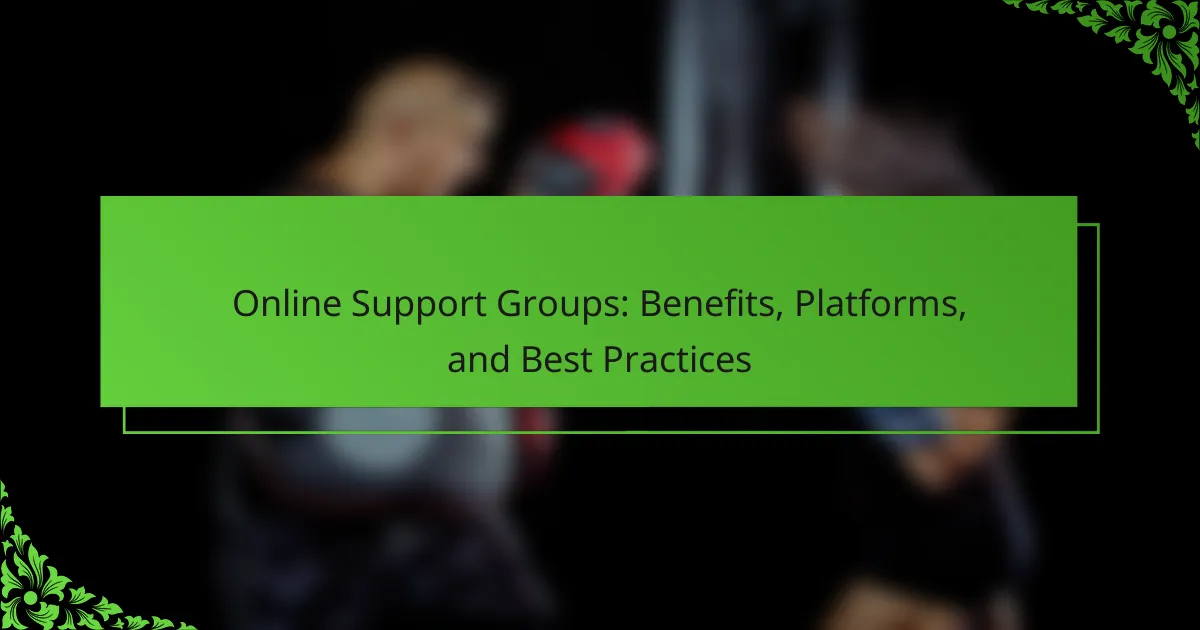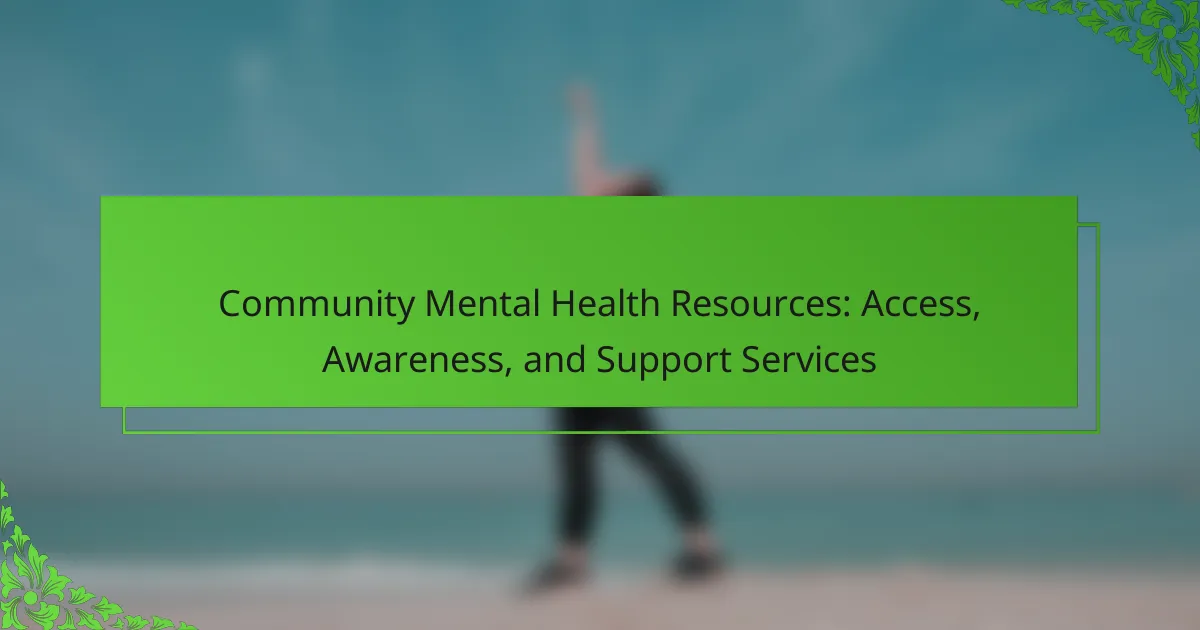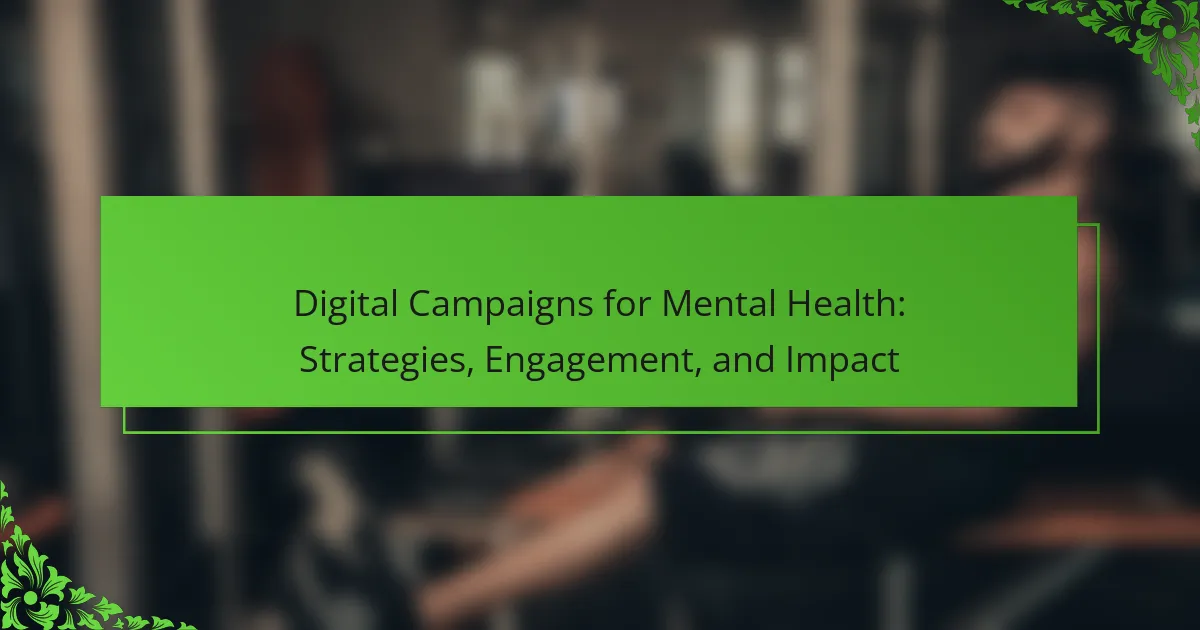Online support groups provide emotional support and community connection, helping individuals reduce feelings of isolation. This article explores the benefits of these groups, highlights popular platforms like Facebook Groups and Reddit, and shares best practices for maximizing engagement. It also addresses challenges such as security and misinformation that participants may face.
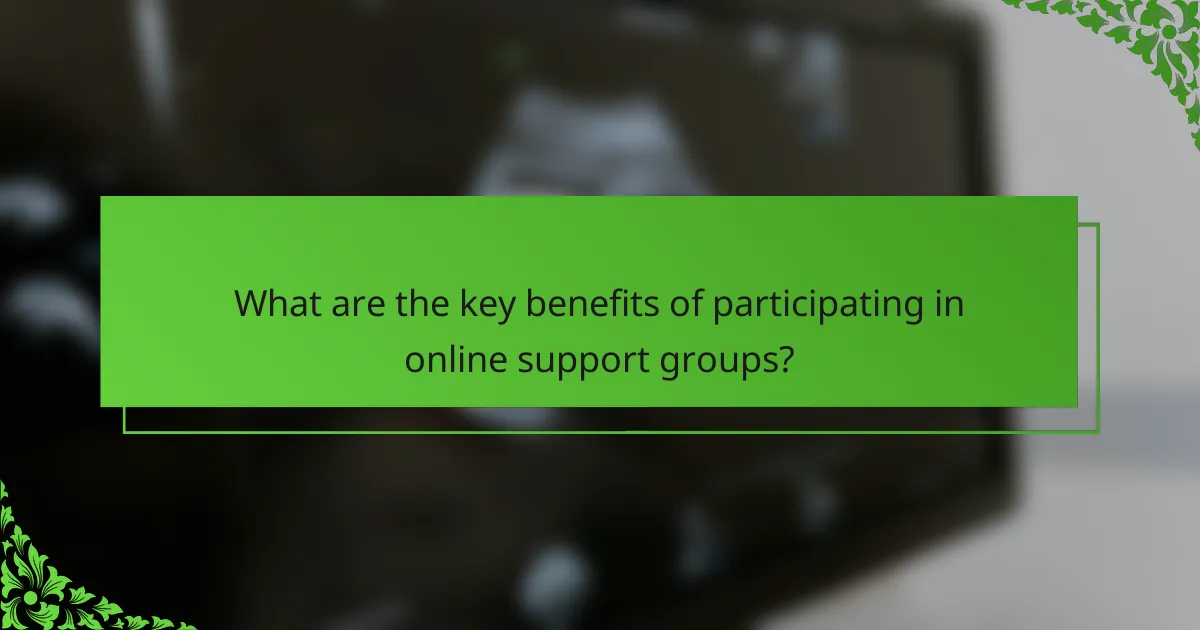
What are the key benefits of participating in online support groups?
Participating in online support groups offers emotional support, community connection, and shared experiences. These groups provide a safe space to discuss challenges, reducing feelings of isolation. Participants often gain practical advice and coping strategies from others facing similar issues. Moreover, online platforms enable access to diverse groups, increasing the chances of finding a supportive community that fits individual needs.
How do online support groups foster community and connection?
Online support groups foster community and connection by providing a safe space for individuals to share experiences and emotions. These platforms encourage open dialogue, reducing feelings of isolation. Participants benefit from shared knowledge and support, reinforcing social bonds. Regular interactions create a sense of belonging, enhancing mental well-being.
What psychological benefits can participants gain from online support groups?
Participants in online support groups can gain improved emotional well-being, enhanced coping skills, and a sense of belonging. These groups foster connection and provide a platform for sharing experiences, which can reduce feelings of isolation. Research indicates that individuals often report increased self-esteem and resilience after engaging in supportive online communities. Furthermore, the anonymity offered by online platforms can encourage more open sharing, leading to deeper discussions and insights.
Which demographics benefit most from online support groups?
Individuals facing mental health challenges, chronic illnesses, or social isolation benefit most from online support groups. These demographics gain access to community, shared experiences, and emotional support. Online support groups provide anonymity, making it easier for participants to express themselves. Additionally, they offer flexibility in participation, accommodating varying schedules and locations. This accessibility can significantly enhance the well-being of these individuals, fostering a sense of belonging and understanding.

What platforms are most popular for online support groups?
Popular platforms for online support groups include Facebook Groups, Reddit, Discord, and specialized sites like 7 Cups and SupportGroups.com. Each platform offers unique features that cater to different needs, such as anonymity, community engagement, and accessibility. Facebook Groups provide a broad reach, while Reddit allows for topic-specific discussions. Discord facilitates real-time communication, and 7 Cups offers professional support. These platforms enhance connection and provide valuable resources for individuals seeking support.
How do social media platforms facilitate support group interactions?
Social media platforms enhance support group interactions by providing accessible communication, fostering community, and offering anonymity. Users can connect regardless of location, share experiences, and receive real-time feedback. Features like group chats, forums, and live video sessions facilitate engagement and emotional support. Additionally, the ability to share resources and information strengthens group dynamics.
What specialized platforms cater to specific needs in online support groups?
Specialized platforms for online support groups include forums, social media groups, and dedicated mental health apps. These platforms cater to various needs such as anonymity, accessibility, and topic focus. Examples include 7 Cups for emotional support, SupportGroups.com for community-based discussions, and Facebook groups for peer support. Each platform offers unique features like professional guidance or user-driven content, enhancing the support experience.
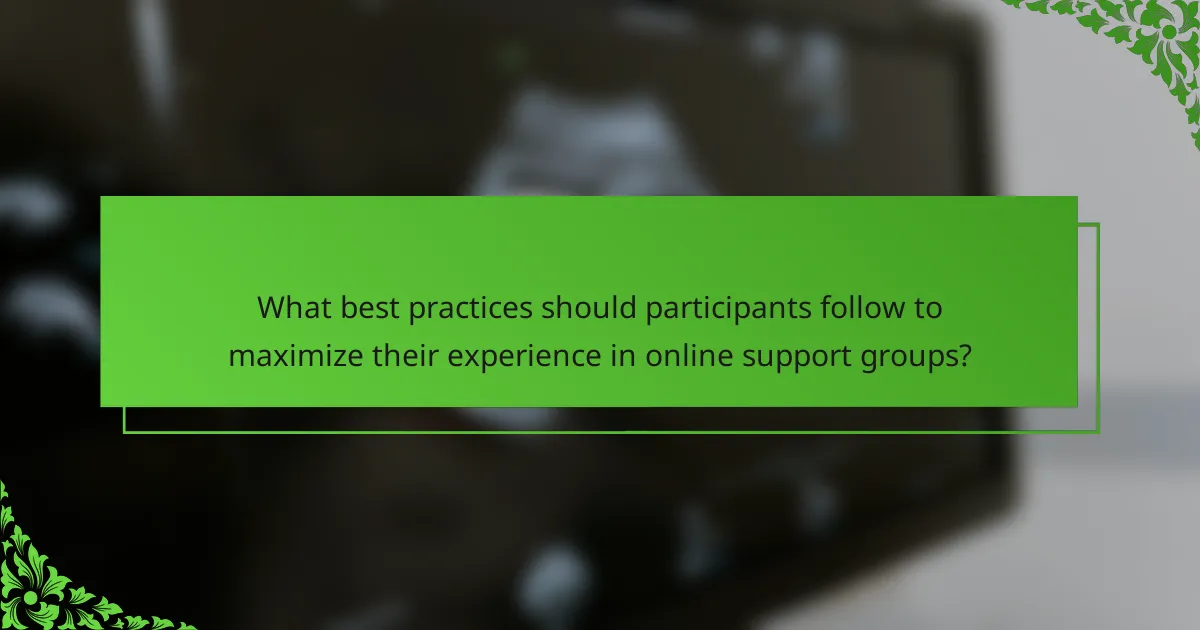
What best practices should participants follow to maximize their experience in online support groups?
To maximize their experience in online support groups, participants should engage actively, maintain respect, and establish clear boundaries. Active participation fosters connection and support among members. Respect for differing opinions enhances a safe environment. Setting boundaries helps protect personal privacy and emotional well-being. Additionally, participants should utilize available resources and tools provided by the platform to enhance their interactions. Regular attendance can also strengthen relationships within the group, leading to a more fulfilling experience.
How can users maintain privacy and safety while engaging in online support groups?
Users can maintain privacy and safety in online support groups by following specific guidelines. First, use anonymous usernames to protect personal identity. Second, avoid sharing sensitive information such as real names, addresses, or contact details. Third, utilize secure platforms that offer encryption and privacy settings. As a result, users can engage more freely while minimizing risks. Additionally, it’s beneficial to familiarize oneself with the group’s rules and moderation policies to ensure a safe environment.
What strategies can enhance communication and support within online groups?
Effective strategies to enhance communication and support within online groups include fostering a welcoming environment, encouraging active participation, and utilizing structured discussions. Establish clear guidelines to promote respectful interactions. Regularly scheduled check-ins can help maintain engagement and provide emotional support. Additionally, leveraging multimedia tools like video calls can strengthen connections among members.
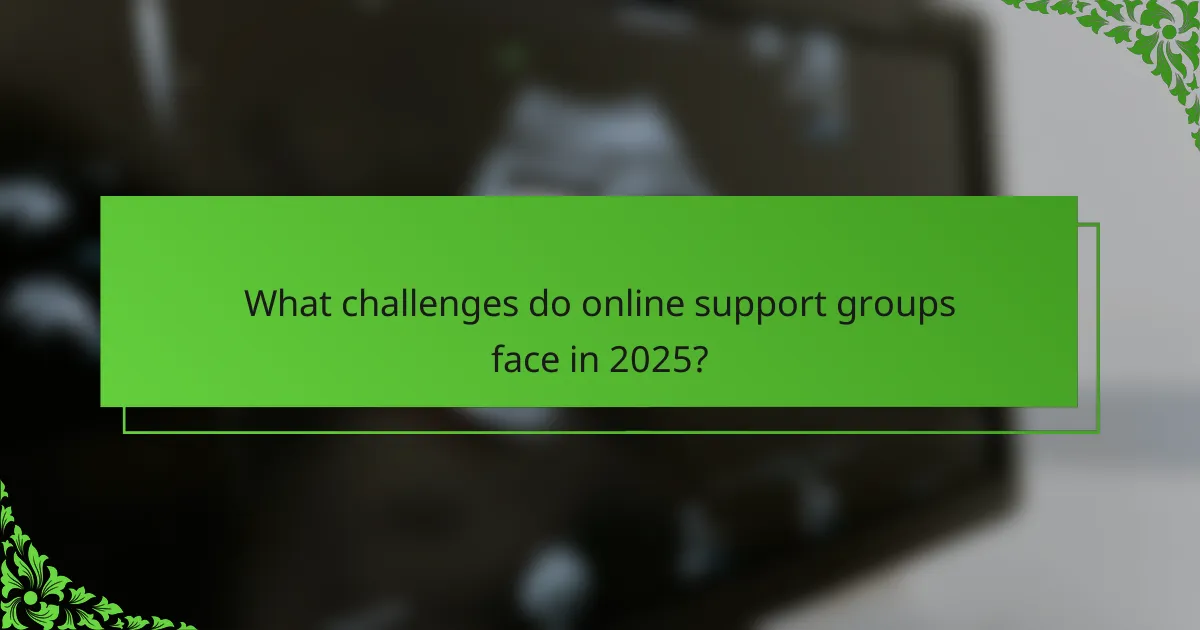
What challenges do online support groups face in 2025?
Online support groups face significant challenges in 2025, including platform security, participant anonymity, and misinformation. Security breaches can compromise user data, while maintaining anonymity is crucial for open discussions. Misinformation can lead to harmful advice, undermining the group’s purpose. Additionally, managing diverse user needs and fostering genuine connections remain ongoing hurdles.
How do moderation practices affect the quality of online support groups?
Moderation practices significantly enhance the quality of online support groups by fostering a safe and respectful environment. Effective moderation prevents harmful interactions, promotes constructive dialogue, and ensures adherence to community guidelines. This leads to increased member engagement and trust. For instance, studies show that moderated groups report higher satisfaction rates among participants. Additionally, unique moderation techniques, such as peer moderation, can further improve the quality of discussions by leveraging community insights.
What technological barriers can hinder participation in online support groups?
Technological barriers such as poor internet connectivity, lack of access to devices, and inadequate digital literacy can hinder participation in online support groups. These issues can prevent individuals from effectively engaging with others and accessing resources. Limited access to reliable technology restricts opportunities for connection and support, impacting overall participation rates.

Which unique features differentiate successful online support groups from less effective ones?
Successful online support groups prioritize clear communication, active participation, and a sense of community. Unique features include structured moderation, diverse member backgrounds, and tailored resources. These elements foster trust and engagement, differentiating effective groups from less successful ones.
How does the presence of trained facilitators influence group dynamics?
Trained facilitators significantly enhance group dynamics in online support groups by fostering trust and encouraging participation. Their presence helps establish a safe environment, promoting open communication among members. Facilitators guide discussions, ensuring that all voices are heard, which can lead to improved emotional support and shared experiences. Additionally, they can manage conflicts and keep conversations on track, contributing to a more cohesive group experience. This structured guidance ultimately enhances the effectiveness and satisfaction of participants in online support settings.
What role does group size play in the effectiveness of online support groups?
Group size significantly impacts the effectiveness of online support groups. Smaller groups often foster deeper connections and encourage more open sharing, while larger groups may provide diverse perspectives but can dilute individual engagement.
Research shows that groups with 5 to 10 members typically enhance participation and emotional support. In contrast, groups exceeding 20 members may face challenges in maintaining cohesion and personal interaction.
Ultimately, the ideal group size balances individual attention with the richness of shared experiences, tailoring the support environment to meet members’ needs effectively.
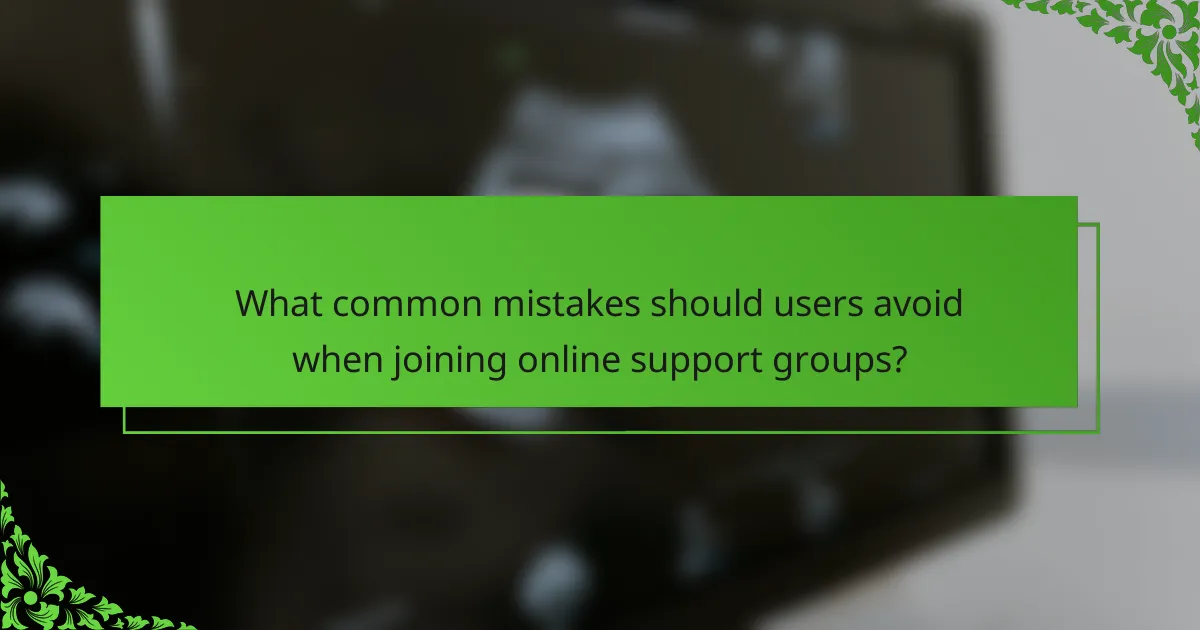
What common mistakes should users avoid when joining online support groups?
Users should avoid oversharing, disregarding group guidelines, and neglecting privacy. Failing to set clear boundaries can lead to discomfort and misunderstandings. Engaging respectfully and following established protocols enhances the online support experience. Additionally, users should be cautious of joining multiple groups simultaneously, which may dilute their focus and commitment. Prioritizing quality interactions over quantity fosters a more supportive environment.
How can over-sharing impact group dynamics and individual experiences?
Over-sharing can disrupt group dynamics and individual experiences by creating discomfort or conflict. Excessive personal disclosures may lead to feelings of vulnerability among members, which can hinder open communication. Additionally, it may overwhelm others, causing disengagement or withdrawal. Establishing boundaries is essential for maintaining a supportive environment in online support groups.
What are the pitfalls of relying solely on online support without professional help?
Relying solely on online support can lead to misinformation, lack of personalized guidance, and potential isolation. Online platforms may not provide the depth of understanding that professional help offers. Users might miss critical insights that trained professionals can deliver. Additionally, emotional support from peers may lack the structure necessary for effective recovery or coping strategies.
What practical tips can enhance the effectiveness of online support group participation?
Participating effectively in online support groups requires active engagement and clear communication. First, set specific goals for what you want to achieve from the group. Second, share your experiences honestly to foster connections. Third, practice active listening by acknowledging others’ contributions. Fourth, maintain regular attendance to build rapport. Finally, utilize platform features, like chat or forums, to enhance interaction.
